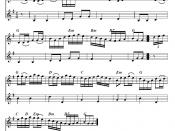The use of music in this novel illustrates the development in character for Stobrod, father of Ruby. In the novel Stobrod does not appear in a good light to the audience, from Ruby's description and from the first time we meet him, when he is caught in the trap that Ruby and Ada set for thieves. He was described by Ruby to be drunk and disreputable throughout her time with him. However as we get a bigger in depth look at the character of Stobrod, it is easy to see how music has shaped his ideas, way of life and manner.
Ruby and Ada free Stobrod from the trap and make him food, for his travels, Stobrod thanks them and gets on his way, he then reappears later in the afternoon with his fiddle. The fiddle he produces, Stobrod claims is made by himself, he explains how he hunted a rattlesnake and put its rattle into the body of the fiddle.
The reason behind doing this is so that his music would have the "dire keen of snake warning." This already shows the significance that music holds for Stobrod as he strives to create this distinct sound for his fiddle.
He tells Ada and Ruby of the story where he was requested to play his fiddle, by a man for his fifteen year old daughter. The girl he was asked to play for was dying she had undergone an accident in the kitchen and had been 'charred to the bone' by an exploding circle of cast iron. He was brought an hour away from his camp to the girl's bedside, where she requested him to play her a tune. Stobrod played through his entire repertoire of six songs, however each song were all dance figures, "Stobrod knew them to be in poor keeping with the occasionâ¦" After he had played the girl asked him to play her another, to which Stobrod replied that he did not know any others. The girl then asked him to make one up, "Stobrod marveled at such a strange request. It had never entered his mind to give composition a try." As he sat their thinking, he began to 'pluck the strings'. He set the fiddle up and "was himself surprised by the sounds that issued. The melody was slow and halting, and it found it's mood mainly through drones and double stops." Stobrod said that when the mother of the girl heard it that she burst into tears, the girl after listening to the song told Stobrod the tune was fine. He had never played such an evoking piece. This piece changed his whole outlook on music. The fact that the music evoked such emotion as to bring her mother to tears introduced to meaning to playing the fiddle for Stobrod and from this moment we are aware that Stobrod changed as a person.
The music that he played for the girl was a piece of music that he had played ever since. He said that he never tired of it and believed the tune to be 'inexhaustible'. "His fingers had stopped the strings and his arm had drawn the bow in the shape of the tune so many times by now that he no longer thought about the playing." This quote shows how Stobrod changed his character how before he only learned 6 songs but they had no meaning as he said he played them for the sake if playing them, Stobrod's repertoire of now 900 tunes creates a sense of peace and harmony for Stobrod. When he talks about the tune he played to the dying girl, he says the melody has now become a "habit" and that serves to give "order and meaning to a day's end." Stobrod claimed that from this moment he spent much of his time in 'Taverns and Rank Places' not drinking liquor like he previously would have done, but learning new tunes from musical niggers. He expresses a passion to Ruby that was not drinking or any of the bad habits he once possessed. "He'd take out his fiddle and play till dawn, and every time he did, he'd learn something new." Music injected meaning and reason behind Stobrod's life, giving a purpose, goals to achieve without his old habits like drinking or such like interrupting or being considered more important.
Stobrod changed his character and persona through his music he found new meaning in learning new tunes and playing important ones over and over again. It injected rules and achievement into his life a new found pleasure that he enjoyed because it made not only him good but others. Ruby clearly states to Ada after she is told of Stobrods journey; "he's finally found the only tool he's ever shown any skill at working. A man so sorry that he got his nickname from being beat from half to death with a stob after he was caught stealing a ham." This gives us a good contrast to Stobrod's life before where it had no meaning, to the one he leads now where he is able to enjoy something he takes pleasure in without badly affecting others and essentially redeeming his once sinful life. Ada ends this chapter with "no matter what a waste one has made with one's life, it is ever possible to find some path to redemption." However bad Stobrod's life was before he has turned around and made something of his life now.





